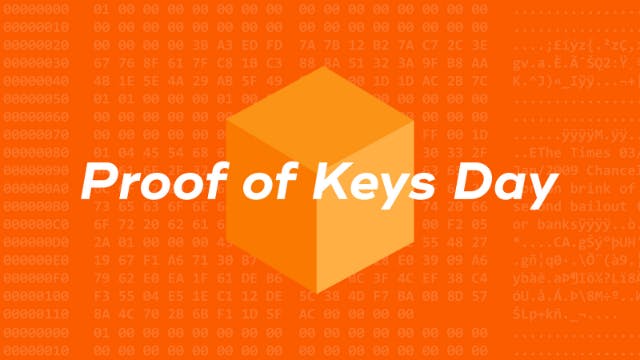Crypto History: Proof of Keys Day
Published on
January 1st, 2021
Share
On January 3rd, 2009, Bitcoin’s first event was recorded by the elusive figure and founder of Bitcoin, Satoshi Nakomoto. This block is known as the genesis block. Satoshi left a message inside this block: "The Times 03/Jan/2009 Chancellor on brink of second bailout for banks."
With this message, Satoshi intended to make the motivation behind Bitcoin's creation as straightforward as possible; total financial sovereignty, free from the oversight of governments and traditional banks.
At the height of the great financial crisis, trust in traditional banking institutions was at an all-time low. Satoshi's vision for Bitcoin was to empower people to forgo conventional economic structures for a new kind of financial system that caters to the needs of the people and not the technical/geek or wealthy elite.
Public vs. Private Keys
An integral component of Bitcoin's design that allows you to have full control over your money is the concept of public and private keys. Your public key is the one you share with others so they can send crypto to your digital wallet. Your private key should only be accessible to you because if someone else were to get their hands on it, they could get full access to your funds. Another way to look at this is Public Key = the ability to deposit and Private Key = the ability to withdraw funds.
Essentially, your crypto wallet has a digital lock on it, and the only way to move money out of that wallet is with the private key. Like how I can push a letter through the mail slot on your front door (public key), but if I were to find the private key to your house, I could effortlessly enter and steal your valuable belongings. (For the record, I would never do that, but others may be less virtuous.)
Keeping your private key secure is crucial to fully enjoy the decentralized benefits of Bitcoin and maintain total control of your coins. Along with the private key, you also have a code of 12 words that allow you to restore/recover your private/public keys when combined. Make sure you store these in a secure location.
Proof of Keys Day
To celebrate the tenth anniversary of the genesis block and the principles behind Bitcoin, Trace Mayer, avid crypto investor and host of the Bitcoin Knowledge podcast, launched the first official "Proof of Keys' day on January 3rd, 2019.
Mayer christened this day as "Proof of Keys" as a way to remind those in the crypto community of the financial sovereignty that Bitcoin creates. The only way to fulfill this sovereignty is to maintain complete control over your private keys.
Proof of Keys day is embodied by a saying in the crypto community, "not your keys, not your wallet." To celebrate, BTC owners move any BTC they have held in a custodial wallet maintained by a third-party crypto exchange like Coinbase to their personal or non-custodial wallets.
Suppose you store your cryptocurrency in a wallet maintained by an exchange. In that case, that means the exchange has complete control over your private keys. In this case, there is always a risk that the third-party involved could be hacked or compromised in some way, and you could potentially lose your crypto.
To learn more about the difference between custodial and non-custodial wallets, check out our article Cryptocurrency Explained: Crypto Wallet.
The philosophy behind Proof of Keys day is perfectly aligned with the foundational principles of Bitcoin. It is an active attempt to replace third-party go-betweens with a trustless value-transfer system. In this system, individuals can cooperate securely and confidently with one another - with full monetary autonomy.
To learn more about Bitcoin's trustless value-transfer system, check out our article Cryptocurrency Explained: How Does Bitcoin Work?.
Proof of Keys day is a simple celebration intended to remind crypto enthusiasts that the beauty of Bitcoin lies in its ability to provide financial freedom. But to achieve this kind of independence, it's essential to keep your private keys private. Millions participate in the movement, moving funds away from exchanges to personal wallets.
As Bitcoin becomes more mainstream, events like the Proof of Keys day will help educate the community about the importance of private key ownership and general security principles.
Share

